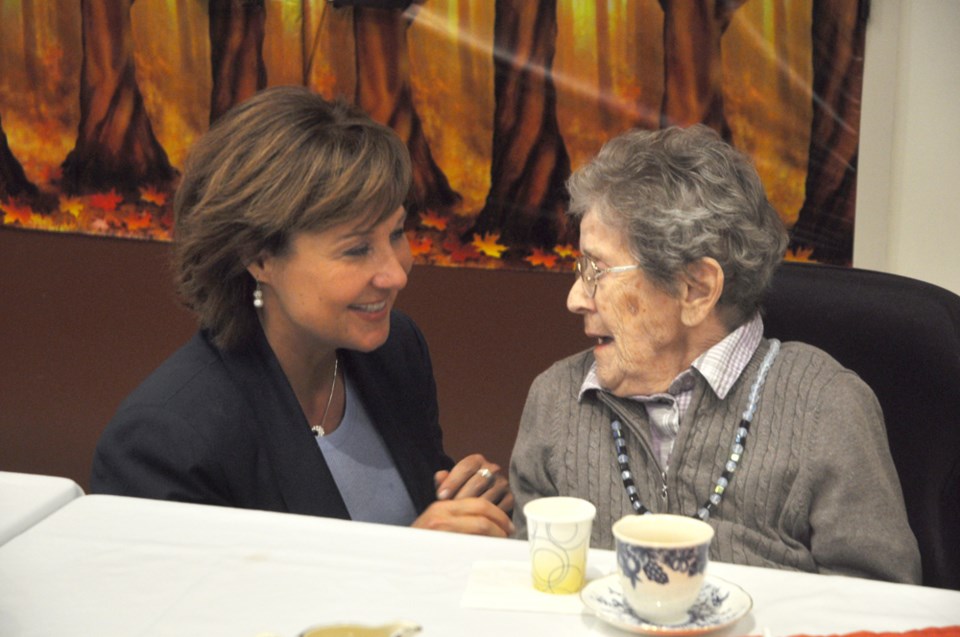With the sounds of construction in the back drop, Premier Christy Clark was at Burnaby’s George Derby Centre Monday to announce a half billion dollars in funding for affordable rental housing around the province.
Billed as the “largest housing investment ever” in the province’s history, the $500 million will go toward creating 2,900 rental units for low-to moderate-income renters, seniors, youth and other groups.
The Premier noted part of the funding is coming from the 15 per cent foreign owner property tax that was introduced in July.
“You can’t live the kind of life you hope for in this country and you can’t raise your children in the way you’ve always dreamed of, if you don’t have a decent roof over your head,” Clark said during the announcement.
The announcement was also an opportunity for the Premier to weigh in on the demoviction issue taking place in the Metrotown area.
Clark said all three levels of government, including municipalities and the federal government, have to pull their weight on the issue, noting the province is doing so through the foreign tax, transit investments and the $500 million affordable housing investment.
She suggested, when it comes to rental housing, local governments have the biggest role to play, adding where there is as shortage of rental housing, mayors and councils have to zone more rental housing.
“Zoning is an area exclusively on mayors and councils,” Clark said. “Local mayors and councils have to be a part of the solution because we can’t do the zoning for them.”
The demoviction issue heated up in Burnaby this summer when a group protesters took over a vacant building slated for demolition at 5025 Imperial St. Much of the protest was aimed at the city and Mayor Derek Corrigan over the demolition of older buildings in the Metrotown area to make way for new developments. Changes to the current Metrotown development plan could mean the loss of 3,000 current rental units in the area.
Housing Minister Rich Coleman, who was also on hand at George Derby Centre, blamed local Burnaby politicians for not being a willing partner to address affordable housing issues in the city.
Specifically, he noted the situation regarding the building of a homeless shelter in the city.
“There’s people in this community that have been asking for a shelter and supportive housing for people [dealing with] homelessness for a long time,” Coleman told the NOW. “They (the city) won’t give us a location where we could actually do that. If they would zone a piece of property or tell us where to go, we would probably do that.”
The housing minister also noted developments planned in the Brentwood and Lougheed town centres as opportunities for rental housing, adding the province would consider some options.
At Monday night’s city council meeting, the civic politicians took the opportunity to respond, noting the city doesn’t have the power to rezone for more rental housing.
Corrigan said municipalities have been asking for authority to rezone for rental housing since 1990, but told it would interfere with private property rights.
He suggested the premier has a misunderstanding of what the city can do.
Coun. Sav Dhaliwal said he was surprised to hear the comments from the premier, also noting that it was his understanding the city didn’t have the power the Clark was mentioning.
“To say that local governments are not doing enough, in my thinking it’s not a very responsible way in asking local government to help,” he said.
Coun. Nick Volkow said the argument that cities are the main obstacle to rental housing is gaining traction, but isn’t true.
“We don’t have the ability to zone for rental as much as we would like to,” he said, adding the lack of cooperation between the provincial and federal governments has created a “crisis of their own making.”
As for Monday’s announcement, the province said it has already identified several projects, adding all projects will be identified and approved by March 2017. The new housing will be completed within the next two to three years.



